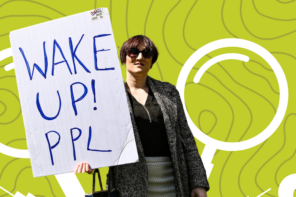Below is the second of a two-part interview with Charles Kriel and Katharina Gellein Viken on their new documentary, People You May Know. Read the first part here. — eds
***
CS: Let’s talk some more about churches and tech in the context of outreach. The big question I have is, were you surprised to find churches engaging in what we might consider predatory behavior? I think I gathered from the film that you find that a lot of pastors at these smaller churches don’t mean to be doing anything nefarious with people’s data, they don’t know how these apps are being used? But others are willing players in the use of microtargeting for political purposes.
Given my own background growing up with a music pastor for a dad and seeing how the sausage is made, when I see that churches are using third-party apps to target the sorts of people who tend to become adult converts—addicts, alcoholics, people with mental health issues, people going through divorce—it doesn’t surprise me at all. I think it’s quite insidious, and it’s an amazing use of technology, but I come from the kind of churches for which this just seems like the logical next step. These kinds of churches always seemed to have what I would call an unhealthy obsession with growing their numbers. So maybe you could speak to that?
KGV: That’s a tough one, because everything we’re talking about here is community, belonging. And that’s what we all want. I mean particularly now, particularly in this crisis—it’s tough times in a lot of places, and the church has always been this place to come into for support. There’s plenty of good that can be done around that. I even think a lot of these programs are doing a lot of good.
But the potential for exploitation is so vast, and the trade-off over time becomes extremist views. Nobody ever says to you the day after you join a church, well, you should submit to your husband, you don’t have any autonomy as a woman. No one’s going to say that on day one; they’ll introduce you to it gradually over time, and by the time you get into the extremist stuff, you have a circle of friends, you’re in it.
CS: You’re invested, you’ve been brought in through the ‘love-bombing.’ One part of the film that I really liked was the discussion with Gloria Beth Amodeo, who is an online friend of mine I hope to meet in real life someday…
KGV: She’s lovely.
CS: I was impressed with the way that she talked about this whole process in conjunction with what was then Campus Crusade for Christ, now Cru, using these techniques; how the people in Cru began isolating her from her family as they drew her in. Is there anything you’d like to say about that?
CK: I just think that if you’re looking for someone who needs community and needs a place to belong—who’s emotionally vulnerable, so they’re easy to pull in—you’re going to surround them with kindness and support. But you’re also going to surround them with ideology. And then you’re going to hope to move them in that direction.
All the founders are Christians who say they’re using these tools for evangelism. But ultimately, these are people who have worked in policy, they’ve worked in Washington, and now they’re going, well how do I apply that to use the churches as voting booths, essentially. And that’s really insidious, because you’re then taking me at a moment of grief, or financial distress, and essentially saying, you can have this robust circle of friends, but here’s the trade-off.
CS: That still doesn’t surprise me; it’s exactly what I grew up with. We knew what was expected of us, which was to be culture warriors, to be all-in for far-right ideology. That simply came with being in the church.
CK: This somehow reminds me, if you go and look at Gloo’s response to our film coming out, at no point has there been a mea culpa. They’ve taken no responsibility whatsoever. They’ve done nothing but call the film “conspiracy theory.”
KGV: When they said they were secular; that was my favorite. They are not a secular organization! Their tech guy [Matt Engel] sat telling me about how this advances the Kingdom. We only have a little bit of him in the film, but I did a long interview with him. The company’s goals are not secular, I’ll tell you that.
CK: It’s an underestimation to say that he’s Gloo’s tech guy. He is the head of their product development.
KGV: Yes, he started with universities, getting kids to finish school—good stuff. But then he pioneered applying the big data approach to churches. He briefly mentions this in the film, but he talked to me more about it—he modeled prayer requests. So he took a bunch of private prayer requests and popped them into a word cloud. Which was somehow okay. And he claims that this is Biblical and that it’s always been done, you get to know your flock, and then you know how to match people. So the way he sees it, it’s not so much about inviting people to church as it is inviting the right person, the right friend, to church.
CS: Let’s take a step back for a minute. Could you speak a little more to the larger ecosystem that Gloo operates in, including how this ties into the secretive, conservative Christian, Council for National Policy?
KGV: You can look at Gloo’s board of directors, look into everyone who works for them, to see that they are a religious organization. That they turn around now that they’ve been caught manipulating politics through churches, and they say no no, we’re secular, this film is pushing a conspiracy theory, is utterly shocking.
CK: Are they denying Christ because they’ve been busted?
KGV: It’s a laughable idea, because any documentary like this has to go through legal checks on both sides of the Atlantic before being allowed out there. So you can’t put out conspiracy theories along large platforms and TV stations, you just won’t get it done.
CK: It cost us more to verify everything in our film, through the lawyers, than it cost us to make the film.
KGV: Now you’re asking for the connection to the Council for National Policy. In the film we tried to show a very simple three-step connection from Cambridge Analytica to these church programs to one of the guys [J.P. De Gance, president and CEO of Communio] who commissioned Cambridge Analytica who’s also a member of the CNP.
Now that doesn’t mean that every organization is connected—it doesn’t mean that everybody’s talking to each other—it just means that they’re all, together, advancing an ultra-right-wing agenda. So you have Gloo, you have i360, which is a Koch platform as well, with voter data. And a lot of this is used in 2016, a lot of it’s being used now under various names. But the CNP has a larger agenda, which is to change the Constitution of the United States. These are all just tools for what you refer to as culture wars, to fundamentally change the country.
CK: When this election is finished, and we’re in the big ambiguous period of deciding what happens next, and we see armed right-wing insurgents in the streets, and simultaneously, we weirdly see churches and preachers backing that—if you want to understand how we got there, this movie’s a really good place to start.
KGV: Everybody understands that swing states are important, but we’re not paying enough attention to what’s happening with the churches in swing states. As shown in the film, the CNP is working to network the churches, to get the churches to be political and to preach politics from the pulpit, and swing people that way. No one really enforces the separation of church and state anymore.
CK: Steve Bannon’s conviction of the coming religious and culture wars, and his desire to accelerate things to get us to that point, the truth is, that doesn’t have to happen. It doesn’t. Even though he’s convinced of it, even though we have a White House full of people convinced of it, even though we have organizations like the CNP out there working for it, it doesn’t have to happen. But the way we stop it from happening is that people who are religious but don’t think that religion should be practiced in this way, and that people who are secular and committed to civil society and democracy, need to become active. That’s absolutely critical.
CS: So, as my final question, I wanted to ask how the film has been generally received so far.
CK: So far, we’ve been amazingly short of trolls and horrible reviews.
KGV: It’s shocking. I expected much more controversy. A lot of people have come with amazingly positive reviews and said that this is really important, and covered things that they didn’t know.
CK: In terms of it getting out there, we’ve found that around the world there’s a much stronger embrace of it in countries that are more secular, and that’s really interesting. In the United States we’re on Sundance and Fusion, and via Prime, for Sundance. But I think there’s a nervousness on the part of broadcasters in America—not about taking on politics or Donald Trump, but about taking on the CNP. The fear of taking on the CNP is that you have these national religious broadcast networks, and if I were a big broadcast network in the United States, yeah, I’d be a little afraid of Donald Trump, but I’d be more afraid of a Christian boycott of my platform.
CS: This is something I’m constantly up against in trying to get a seat at the table for ex-evangelicals as stakeholders in discussions of evangelicalism.
KGV: We can see the media resistance to taking on some of these issues for sure. And it’s because the knee-jerk response is, oh, it’s anti-Christian, it’s anti-religious. But we’re in fact talking about the exploitation of Christians.
CK: If an evangelical Christian is watching the film, I hope they come away from it shocked at the way that their data has been harvested and that they have been targeted, even if they agree with what the targeting was trying to do. We’re anything but anti-Christian.
KGV: I grew up evangelical myself, and I’ve been very happy to hear from the Christian communities that have seen the film; from Christians who have been shocked at the level of exploitation and coming on Twitter and other places saying that this is not what Christianity should be about.
CS: Any final thoughts you’d like to share?
CK: I hope people come away with more awareness about the way that they conduct themselves online and the way that affects their communities.
CS: Thank you so much for your time; I feel like I could personally talk to you for hours about this stuff.
CK: Thanks a lot.





